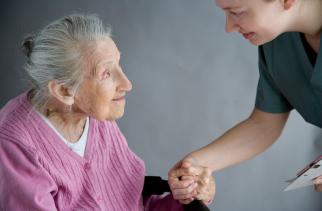
Community nurses often shape patient participation in nursing documentation by verbal communication
Patients have the right, by Dutch legislation, to access and supplement information in health records. According to community nurses it is important that patients participate in nursing documentation. To achieve this they experience several challenges, like technical issues with electronic health records. Nurses still try to achieve patient participation by verbally discussing patients’ views. Less often patients read along in the health records. These results of a qualitative study from Nivel are published in BMC Nursing.
Patient participation in nursing documentation has several benefits, like including patients’ personal wishes in tailored care plans and facilitating shared decision making. However, community nurses face several challenges in realizing patient participation.
Access to electronic health records can fail
One of the main challenges is related to electronic health records. Due to poor internet connection or failures in the health records community nurses are often not able to document at patients’ homes. As result they lose an opportunity to consult patients during documentation. To solve this nurses discuss verbally with patients what they should report at a later moment.
Tailored approach for each patient
Not all patients feel a need to participate in documentation, especially people who are severely ill. Patients can see participation as a burden, according to interviewed community nurses. They say it is important to tailor to the wishes of an individual patient. Therefore, nurses sometimes deliberately choose to communicate verbally about the provided nursing care, instead of actively involving a patient in the documentation.
If someone is really sick, I don’t always want to burden them with what I write down or what you hand over to your colleagues. So I don’t always involve them in the documenting then.Interviewed community nurse
About the research
In 2019, qualitative interviews were conducted with 19 community nurses. These nurses all worked with electronic health records. Now the nurses’ perspective is clear we will next focus on the perspective of home care patients regarding their participation in electronic nursing documentation.
This research project relates to Nivel's research program Nursing Care and Elderly Care (lead by prof. Anneke Francke, PhD).


